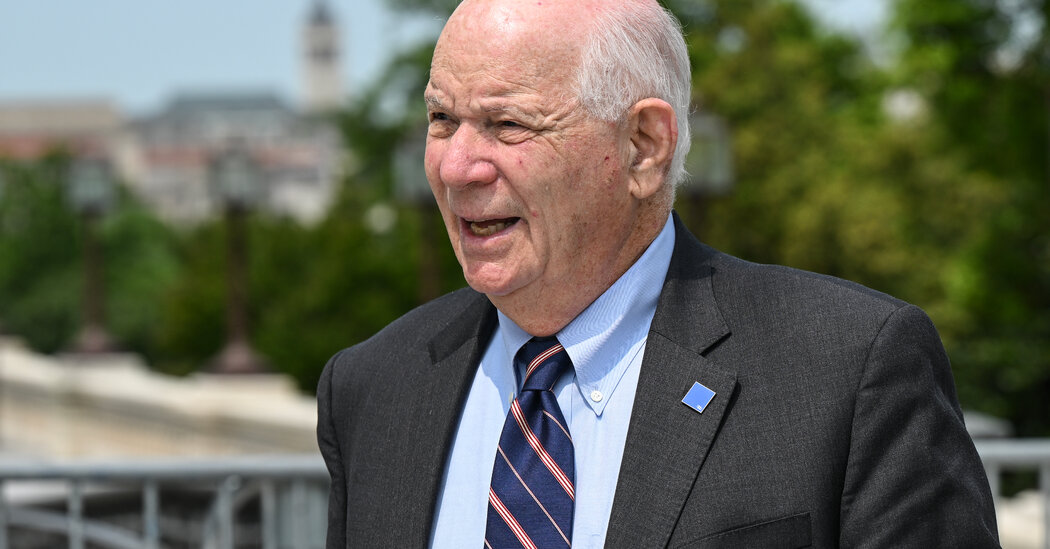Senator Ben Cardin of Maryland, the new chairman of the Senate Foreign Relations Committee, pledged on Saturday to block the release of $235 million in military aid to Egypt, a move that could force the Biden administration to reverse its decision to prioritize national security interests over Congress’s concerns about the country’s human rights record.
In a statement, Mr. Cardin also threatened to withhold future military aid for Egypt unless the country made demonstrable progress on releasing political prisoners, improving conditions for human rights activists and other issues.
“I believe it is imperative that we continue to hold the government of Egypt, and all governments, accountable for their human rights violations,” Mr. Cardin said. “I intend to exercise fully the committee’s oversight responsibilities and my authorities to block future foreign military funds as well as the sale of arms to the government of Egypt if it does not take concrete, meaningful and sustainable steps to improve the human rights conditions in this country.”
Mr. Cardin’s move comes just days after he took over the chairmanship of the foreign relations panel from Senator Robert Menendez, Democrat of New Jersey, who was indicted last week on charges of taking bribes to facilitate sales of military equipment to Egypt and help an Egyptian American with close ties to the government in Cairo with his halal meat certification business.
Those allegations have increased the pressure on lawmakers, particularly Democrats, to distance themselves from Mr. Menendez and insist that Egypt meet congressionally mandated benchmarks on human rights before the military aid is transferred.
Mr. Menendez, who stepped down from the committee chairmanship, has maintained his innocence.
Mr. Cardin told reporters this week that as chairman he would “make sure that our foreign policy is wrapped in our values: democracy, human rights, anti-corruption, transparency, and accountability.”
But the decision to double down on that promise in regards to Egypt’s military aid put him in direct conflict with the Biden administration.
State Department officials previously decided that the security relationship between Cairo and Washington was too vital to jeopardize by withholding the $235 million in military aid and that Secretary of State Antony J. Blinken was pressing the Egyptian government on human rights issues in other forums.
On Friday, Representative Gregory W. Meeks, Democrat of New York and the ranking member of the Foreign Affairs Committee, called on the State Department to “pause a portion of U.S. military financing to Egypt that is conditioned on human rights criteria,” arguing that Congress “needed more clarity” on how those concerns were being addressed.
The Republican leaders of the Senate and House foreign affairs panels have not publicly registered any objections.
For decades, the State Department has deferred to the leaders of the Senate and House panels overseeing foreign affairs when they objected to weapons transfers to foreign governments, though the Trump administration contemplated ending that practice, and used its emergency powers to outmaneuver Congress in 2019.
Egypt has been one of the top recipients of U.S. military aid since signing a peace treaty with Israel in 1979, and currently is awarded approximately $1.3 billion per year in foreign military financing. A portion of that aid is conditioned on Egypt making improvements on human rights, however, though Congress gives the administration a waiver that can be used to skirt those requirements.
In the fiscal cycle that ends on Saturday night, $320 million of Egypt’s military assistance was supposed to be tied to the government’s progress on human rights, but the Biden administration elected to withhold only $85 million.
Two weeks ago, the administration announced that the remaining $235 million would be awarded to Egypt, similar to decisions in previous years to waive congressional stipulations and provide Egypt with aid that was supposed to be tied to its human rights performance.
State Department officials declined to say how the agency would respond to Mr. Cardin’s announcement. A spokesman said that officials were continuing to hold discussions with Congress about how to provide Egypt with the military aid Mr. Cardin had moved to block while ensuring that Cairo makes progress on human rights.
Edward Wong contributed to this report.


